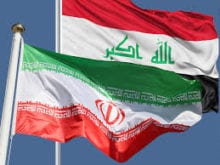Al-Monitor — The transfer of several Americans from Iran’s notorious Evin Prison to house arrest is only the first step in a series of coordinated moves to secure their permanent freedom.
The detainees, including Siamak Namazi, Morad Tahbaz and Emad Shargi, are expected to remain at a hotel under Iranian guard until the country’s frozen energy revenue is transferred from South Korea to an account in Qatar, a process that people familiar with the arrangement say could take weeks or more.
Ali Vaez, the Iran director for the International Crisis Group who closely tracks the negotiations, warned of possible “‘Argo’ moments” before the Americans are released.
“This deal is unfolding in a very unstable context,” Vaez said, adding there is “plenty of time for spoilers on both sides to try to prevent this deal from being finalized.”
That includes the possibility of tit-for-tat hostilities between US forces and Iranian proxies in Syria and Iraq. Also adding to the tensions, as my colleague Jared Szuba reports, is the buildup of US military forces in the Persian Gulf amid Iran’s attempted seizures of commercial tankers.
“So much can go wrong right now,” said Trita Parsi, executive vice president of the Quincy Institute for Responsible Statecraft. “Elements who want to sabotage this on the Iranian side, all they need to do in the next three weeks is to arrest another one.”
There is recent precedent for that. Multiple sources said the arrest of two additional Americans, including a woman who was reportedly picked up in recent weeks, contributed to delays in announcing a deal.
In a statement Thursday, Namazi family lawyer Jared Genser called the prisoners’ transfer to house arrest “at best, the beginning of the end,” explaining, “There are simply no guarantees about what happens from here.”
Prisoner politics. It didn’t take long for the deal to draw Republican fury. In a statement, Senator Tom Cotton of Arkansas called the prisoner pact a “craven act of appeasement” that would “only embolden the ayatollahs.”
The deal to bring the Americans home involves the United States facilitating Iran’s access to some $6 billion in funds held in South Korea. The frozen money could only be used for humanitarian-related purchases such as food and medicine under supervision by the US Treasury Department.
“This is money that Iran should have had access to based on the terms of US sanctions laws, but due to practical issues in South Korea, it did not,” said Henry Rome, a senior fellow at The Washington Institute for Near East Policy.
But Republicans say the Biden administration is incentivizing further hostage-taking with this deal. Former Vice President Mike Pence tweeted that “China and Russia, who are also holding Americans hostage, now know the price has just gone up.”
Idaho Sen. Jim Risch said in a tweet that the arrangement “provides a windfall for regime aggression,” the idea being it frees up funds that Iran can then use on its military, its regional proxies or other malign activities such as funding armed drones for Russia or suppressing dissent at home.
Secretary of State Antony Blinken defended the deal as one that is not granting Iran any sanctions relief. “We focused on getting our people home, but we continue to take strong action against Iran’s other activities that we and so many other countries profoundly object to,” he told reporters.
Left behind. Not included in the planned prisoner swap are US permanent residents, who despite their cases’ similarities to Tabhaz, Namazi and Shargi’s are not considered “wrongfully detained” by the US State Department.
(The Levinson Act, named for the retired FBI agent Bob Levinson, who disappeared in Iran, says the wrongful detention determination can apply to both US citizens and lawful permanent residents. More on that debate here.)
Their exclusion from the agreement came as some surprise to their families, given Rob Malley’s pledge as special envoy that the United States wouldn’t “leave anyone behind,” as it did in 2016 when Siamak Namazi was the only American who didn’t return home as part of the Obama-era prisoner trade.
On Friday, the family of Shahab Dalili staged a protest outside the White House. The retired Iranian shipping captain and legal permanent resident was arrested in Tehran in 2016, two years after immigrating to the United States with his family.
The family went public with his detention, his wife Nahid Khazai told me in a June interview, to ensure that “when they release the hostages, nobody can tell me they didn’t know about Shahab.”
Khazai was disappointed Thursday when Blinken, asked about US permanent residents detained in Iran, said, “I’m not aware of any beyond the five American citizens.”
In addition to Dalili, there is at least one more publicly identified detainee with US residency. Jamshid Sharmahd was sentenced to death in February following what the German government described as a grossly unfair trial. Sharmahd, an opposition figure who is a German-Iranian dual national, was living in southern California prior to his detention.
“Are you aware that you are sealing my dad’s fate with your deal?” his daughter Gazelle Sharmahd tweeted following Thursday’s news.
 Shabtabnews In this dark night, I have lost my way – Arise from a corner, oh you the star of guidance.
Shabtabnews In this dark night, I have lost my way – Arise from a corner, oh you the star of guidance.



